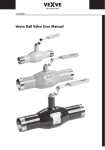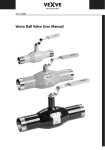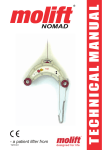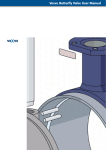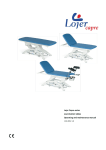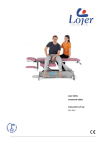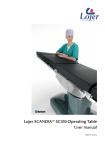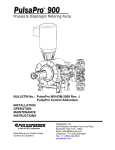Download Vexve Butterfly Valve User Manual
Transcript
30.03.2010 Vexve Butterfly Valve User Manual ∆p = PN 25 ∆p = PN 20 (DN 1200) Vexve Butterfly Valve User Manual Table of Contents 1. General 2. General Instructions and Cautions 3. Valve Markings 4. Valve Transportation and Storage 5. Installations and Welding to the Pipeline 6. Commissioning 7. Maintenance 7.1 Assembly/Disassembly of Manual Gears (ProGear and Rotork) 7.1.1 Manual Gear Adjusting (ProGear and Rotork) 7.2 Assembly/Disassembly of Manual and Electric Actuators (Auma) 7.2.1 Manual Gear Adjusting (Auma) 7.2.2 Electric Actuator Adjusting (Auma) 7.3 Assembly/Disassembly of Pneumatic Actuators 7.4 Changing the O-rings (BFS/BRS types) 7.5 Tightening the Stem’s Graphite Packing (BFC/BRC types) 8. Maximum Allowable Pressure at Different Temperatures 9. Kv Value Chart 10. Construction drawing 1. General Vexve butterfly valves are specially designed for the district heating pipeline closing (type BFS and BRS) and control (type BFC or BRC) applications. Vexve BFC type butterfly valves can also be used in steam applications. When using the valves in other applications or with other medium, please consult with the manufacturer on the suitability. The valve body is pressure equipment steel. The shafts and discs are manufactured from the stainless steel material. The disc seal material is a nickel alloy based super steel material. The stem/shaft sealing is done either O-rings (BFS/BRS Types) or graphite ring packing (BFC/BRC Types) depending on the end application. The valve is bi-directionally tight. The valve opens when turning the manual gear to clockwise. The position indicator line at the end of the stem shows the disc’s position versus the stem. Vexve Oy is not responsible for the damages caused by unknown subjects or dirtiness. Vexve Oy is also not responsible for the damages caused by the improper handling or delivery. 2 Vexve Butterfly Valve User Manual 2. General Instructions and Cautions Please read and notify the following instructions before handling and operating the Vexve butterfly valves: • The valve should be lightly closed during the storage. • Do not lift the valve on the actuator or on the gear. Please follow the instructions from the page 5 (valve lifting). • The weight of the valve should always be taken care when handling the valve. • Beware of the discs cutting movement! The disc creates a cutting motion with its sharp angles during the valve closing. • The valve may cause noise at the pipeline! Be protected against the noise. • The manual gear or actuator may not been removed or dismantled if the valve is pressurized. It is recommended to use a special tools and equipment (designed for actuator removal) when disassembling the valve. • The shaft (O-ring or graphite) packing may not be dismantled when the valve is pressurized. • The valve may not be used alone as a pipeline ending fitting. Always after the valve a blank flange needs to be welded or/and connected to the pipeline end. The space between the flange and the valve should be filled with oxygen-free water. • Do not exceed the manufacturer’s informed maximum closing torques. • Do not exceed the manufacturer’s informed maximum temperature and pressure ranges (sated at the valve identification plate). • Do not use unnecessary power to turn the manual gear spindle and closing the valve. The position indication line at the top of the stem shall not be more than maximum 2 degrees over the closing position. • The installed valve at pipeline can be extremely hot! Be protected to different temperatures. 3 Vexve Butterfly Valve User Manual 3. Valve Markings The identification plate locates at the actuator flange’s side. It has the following information: 1 2 0575 9 10 3 4 5 6 7 8 BFS0600W2 0001001 25 25 11 12 15 2004 200 -40 13 1. Valve Manufacturer 2. Individual Valve Number 3. Valve Type B = Butterfly valve 4. Product Group F = Full Bore R = Reduced Bore 5. Valve Function S = Shut-Off Valve C = Control Valve 6. Valve Size (DN) 7. Connection to the pipeline W = Welding Ends F = Flanged Ends 8. Maximum pressure difference: 1 = 16 bar, 2 = 25 bar 9. Russian Valve Certification 10. CE-Mark and the number of the notified body 11. Pressure Class 12. Approved maximum pressure difference when valve is closed 13. Approved minimum operational temperature 14. Approved maximum operational temperature 15. Manufacturing Year 4 14 Vexve Butterfly Valve User Manual 4. Valve Transportation and Storage Please check that the valve or its parts are not damaged during the transportation. Please also check that the content of the delivery (valve types, sizes, etc.) is according to the agreement. The information on the possible damages or deviations in the content must be immediately informed to Vexve Oy. Store the valve at clean and dry storage before the installation. Do not remove the flow port protectors before the installation. During storage the valve must be lightly closed. Lift the valve as shown in the picture. Do not lift the valve from its actuator or stem. NOTE! The weight of the valve should always be taken care when handling the valve. Please be careful when closing the disc. The disc creates a powerful cutting motion with its sharp edges during the valve closing. 5 Vexve Butterfly Valve User Manual 5. Installations and Welding to the Pipeline The valve may only be installed to places where it is designed and applicable. Do not exceed the valve performance limitations! The maximum operational pressures and temperatures can be found from the valve identification plate. Do not remove the manual gear or actuator from the valve. If the manual gear or actuator needs to be removed during the installation, please follow the actuator manufacturer’s instructions how to adjust the actuator when reassembled (chapter 7). Remove the valve flow port protectors before the installation. Check that the valve is undamaged and clean inside. Close the valve during the welding. It is recommended to install the valve to the pipeline according to the preferred flow direction arrow. Picture 1 Picture 2 Special Instructions – Corners/Elbows & Pumps After corners and centrifugal pumps the pressure on the outer edge is higher than on the inner edge. When installing the butterfly valve immediately after a pipe elbow, we need to install the valve to the pipeline so that the shaft is directly at a 90-degree angle to the corners’ middle point (perpendicular) (please see picture 1). When installing the valve after centrifugal pump, the valve shaft needs to be perpendicular (at a 90 degree angle) to the pump shaft (please see picture 2). It is always recommended to install the valve so that the valve shaft is in horizontal position. This minimizes the forces to the valve disc’s bearings. However, if two (2) valves are installed in-line in close proximity, then the valve shafts need to be at a 90 degree angle (perpendicular) versus each other. 6 Vexve Butterfly Valve User Manual 1 3 4 Picture 1 2 Picture 2 Electric welding is used when welding the valves to the pipeline. If the valve is welded to vertical pipeline, close the valve and cover it at least with 4cm water cushion. This water cushion will then ensure that the welding spatters from the welding procedure cannot damage the sealing and disc surfaces (picture 1). The valve should be first welded to the pipeline by using the bridge spot welding: by welding 4-8 pieces of 5cm seams across the valve (up-down-left-right, etc.). After that the seams between the bridges are welded as shown at the picture (picture 2). Valve may not be used as a line ending fitting alone. Always after the valve a blank flange needs to be welded or/and bolted to the pipeline. Also the backside empty space needs to be filled with water with no oxygen to prevent the corrosion. The possible lid welding has to be minimum 200mm distance from the valve welding seams. 7 Vexve Butterfly Valve User Manual 500 mm The recommended welding procedure is to weld the valve to the pipeline with the welding extensions (please see the attached picture). The bridge spot and seam welding will be done as described in the earlier chapter Installations and Welding to the Pipeline. To minimize the pressure shocks, it is always recommended to use bypass valves with the butterfly valves. 8 Vexve Butterfly Valve User Manual 6. Commissioning The pipeline needs to be flushed carefully after the valve installation. Close the valve during the flushing until the disc is open app. 5 degrees. The small angle’s increased flow cleans efficiently the possible contamination from the valve’s sealing surfaces. During the commissioning, the valve opening will be set to app. 15 degrees to minimize the potential pressure shocks’ impacts to the valve. The largest allowable testing pressure is 1,1xPN, when the valve is closed. During the pipeline pressure testing (1,5xPN), the valve needs to be open. When installing the BFC valve type, the tightness of the graphite packing needs to be checked. If needed to tighten the packing to stop the stem leakage, tighten the hexagonal packings tightening screws (please look the chapter 7.5). Do not tighten the packing too much due it will increase the valve torque. Do not exceed the manufacturer’s informed maximum allowable torque values. 7. Maintenance When preparing for the maintenance, please note that the valve’s surface temperature can be dangerously high when the valve is installed to the pipeline. Be prepared against the potential accidents (burns, etc.). 9 Vexve Butterfly Valve User Manual 7.1 Assembly/Disassembly of Manual Gears (ProGear and Rotork) NOTE! It should be avoided to disassembly the manual gear or actuator, due the valves closing torques are fine-tune in the position where the valves have the best tightness. There is a possibility that the valve actuator settings needs to be re-done if the actuator/gear is disassembled. Do not use unnecessary power to turn the manual gear spindle and closing the valve. The position indication line at the top of the stem shall not be more than maximum 2 degrees over the closing position. The manual gear or actuator may not been removed or dismantled if the valve is pressurized. It is recommended to use a special tools and equipment (designed for actuator removal) when disassembling the valve. Disassembly of the Manual Gear 1. The manual gear or actuator may not been removed or dismantled from the valve if the pipeline is pressurized. The gear operates as opening and closing stopper at the butterfly valve. At the valve itself there is no stoppers. The gears used at butterfly are so called self-holding gears. 2. Close the valve fully (by using the manual gear), for during the manual gear removal (The valve will be closed to the clockwise direction). The spindle is attached to the axial with the pin (4). The pin is designed so that it will break in pieces if too large torque and power is used when handling the gear. This will ensure that the gear itself will not be damaged. 3. Turn the gear/actuator slightly open to decrease the torque and power from the valve and the gear. This will enable the gear spindle to move easily. 4. Before the gear removal, the gear’s bush adapter’s (1) position needs to be marked against the valve shaft. Remove the position indicator plate (3) by disassembling the fastening screws (2), to be able to see the gear’s bush adapter and shaft. At the ProGear manual gear the bush is a separate and at the Rotork manual gears the bush’s shape is machined directly to the gear. 5. Remove the bolts and pull the gear out of its place. If needed, use the dismantle tool by setting the tool’s axis to the top of the stem and the tool’s lugs on the bottom of the actuator. 10 Vexve Butterfly Valve User Manual Manual Gear Assembly 1. The manual gear or actuator may not been removed or dismantled from the valve if it is pressurized. 2. Install the key to the shaft’s key place. 3. Install the manual gear so that the hand wheel locates at the preferred position. Check that the shaft is either at the original position or 180 degrees against the original position. If so, then there is no need for fine-tuning and re-positioning of the actuator. If a new actuator or gear is assembled, then the actuator needs to be set and positioned as described in the chapter 7.1.1. 4. Install and tighten the bolts of the actuator/gear. 2 4 3 1 8 7 6 5 11 Vexve Butterfly Valve User Manual 7.1.1 Manual Gear Adjusting (ProGear and Rotork) 1. Check that the valve has no flow and that the valve is depressurized. 2. Close the valve fully and check that the gear is at the closed position. 3. Install the key carefully to its location at the shaft. 4. Install the gear so that the hand wheel comes to the preferred location. 5. Install the handle to the gear. 6. Crease, install and tighten the nuts of the manual gear’s bolts. If needed, turn the manual gear’s wheel to match the holes of the gear and the actuator flange. 7. Remove the position screws’ covers (5). 8. Loosen the stop screws (6). 9. Turn the hand wheel couple of times and open the closed position (7) and open position screws (8) fully open. 10a. If the pipeline has no flow, the valve limits are set by using the torque key. At first, the wheel of the gear is removed and the torque key attached to the gear’s shaft. The needed torque values are available from Vexve Oy. Please inform the serial number of the valve from the valve identification plate. Please also inform the valve type. 10b If the pipeline has flow, then turn hand wheel as long as you can hear that there is no flow at the pipeline. Do not use unnecessary power to turn the manual gear hand wheel/spindle when closing the valve. The position indication line at the top of the stem shall not be more than maximum 2 degrees over the closing position. 11. When the right closing position has been found, tighten the stop screw for closed position. Then turn it back a 1/4 turn. 12. The stop screw will be locked up either with the locking screw (6) or with the locking sealant (e.g. Loctite 225). 13. Turn the disc 90 degrees (to fully open position) 14. Tighten the stop screw for open position (8), and lock it with locking screw (6) or locking sealant. 15. At the end, install the screw covers (5) to the top of the stop screws. 12 Vexve Butterfly Valve User Manual 2 4 3 1 8 7 6 5 13 Vexve Butterfly Valve User Manual 7.2 Assembly/Disassembly of Manual and Electric Actuators (Auma) NOTE! It should be avoided to disassembly the manual gear or actuator, due the valves closing torques are fine-tune in the position where the valves have the best tightness. There is a possibility that the valve actuator settings needs to be re-done if the actuator/gear is disassembled. Do not use unnecessary power to turn the manual gear spindle and closing the valve. The position indication line at the top of the stem shall not be more than maximum 2 degrees over the closing position. The manual gear or actuator may not been removed or dismantled if the valve is pressurized. It is recommended to use a special tools and equipment (designed for actuator removal) when disassembling the valve. Disassembly of Manual and Electric Actuators (AUMA) 1. The manual gear or actuator may not been removed or dismantled from the valve if the pipeline is pressurized. The gear operates as opening and closing stopper at the butterfly valve. At the valve itself there is no stoppers. The gears used at butterfly are so called self-holding gears. 2. Close the valve fully (by using the manual gear), for during the manual gear removal (The valve will be closed by turning the wheel to the clockwise direction). 3. Turn-off the electric power supply(electric actuators). 4. Turn the gear/actuator slightly open to decrease the torque and power from the valve and the gear. This will enable the gear spindle to move easily. 5. Before the gear removal, the gear’s bush adapter’s (1) position needs to be marked against the valve shaft. Remove the position indicator plate (3) by disassembling the fastening screws (2), to be able to see the gear’s bush adapter and shaft. Remove then the locking ring (4) by screwdriver, and remove the protection plate (5) to be able to see the stem adapter bush. 6. Remove the bolts and pull the gear out of its place so that the stem adapter bush will stay at the bush. If needed, use the dismantle tool by setting the tool’s axis to the top of the stem and the tool’s lugs on the bottom of the actuator. 7. If the stem adapter bush needs to be removed, the height of the bush needs to be marked first to the stem. After marking, the tightening screw is opened (6) and the stem adapter bush is removed by using the dismantle tool. 14 Vexve Butterfly Valve User Manual Assembly of the Manual Gear 1. Check that the valve has no flow and that the valve is depressurized. 2. Install the key carefully to its location at the shaft. 3. Install the stem bush adapter first to the original height (marked at the disassembly) and tighten the screws (6) carefully. 4. When assembling the manual gear, check that the stem bush adapter is in its original position. There is no need to set the gear/actuator settings again when assembled to the original position. If wanted to turn the gear/actuator 180 degrees, then the setting and fine- tuning needs to be done according to the chapter 7.2.1. 5. Install and tighten the bolts of the actuator/gear. 2 3 4 5 8 7 6 1 15 Vexve Butterfly Valve User Manual 7.2.1 Manual Gear Adjusting (Auma) 1. Check that the valve has no flow and that the valve is depressurized. 2. Close the valve and check also that the actuator is at off position. 3. Install the key carefully to its location at the shaft, and push the bush (1) to its place. Look the bush’s right level/height from the actuator/gear and tighten the tightening screw (6) carefully. 4. Install the manual gear so that the hand wheel comes to the preferred direction. 5. Install the hand wheel to the gear if not attached. 6. Crease, install and tighten the manual gears/actuators bolts so that the gear cannot move against the actuator flange. If needed, turn the hand wheel to be able to get the boltholes against each other (at flange and gear). 7. Turn the hand wheel couple of turns to open the valves. Remove the limiting bush’s (8) fastening screws (7) so the bush can turn freely. 8a. If the pipeline has no flow, the valve limits are set by using the torque key. At first, the wheel of the gear is removed and the torque key attached to the gear’s shaft. The needed torque values are available from Vexve Oy. Please inform the serial number of the valve from the valve identification plate. Please also inform the valve type. 8b. If the pipeline has flow, then turn hand wheel as long as you can hear that there is no flow at the pipeline. Do not use unnecessary power to turn the manual gear hand wheel/spindle when closing the valve. The position indication line at the top of the stem shall not be more than maximum 2 degrees over the closing position. 9a. Small Auma gears (<GS160).After finding the right closed position has been found, turn the limiting bush slightly to clockwise direction to position where it does not move anymore. Then turn back the bush app. 1/8 turn. Pull the bush out of its bores (app. 2cm) and install the limiting bush back to its place so that the holes of the bush are in the line with the gear’s holes. 9b. AUMA GS 160 and larger gears the limiting bush does not need to pull out of its bores. In larger valves, the bush will be tightened directly to the right position with the flanges. 7.2.2 Electric Actuator Adjusting (Auma) 1-7 phases done as in the manual gear adjusting (see above chapter) 8. Do the electrical connections so that the actuator has the moment and electrical limit switches in place. (at AUMA MAtic type the connections are done in advance at the factory) 9. Connect the power to the actuator 10. Turn the valve open app. 45 degrees from its manual gear’s hand wheel. Push the open/ close buttons slightly to see that the valve turns to right direction. If the direction is wrong, change the connections and check the opening/closing again. (3-way actuators) 16 Vexve Butterfly Valve User Manual 11a.If the pipeline has no flow, the valve will be calibrated with the help of torque values. At first, open the gear’s lid and install the calibrating torque (you will receive this torque value from Vexve Oy by informing the serial number and size of the valve from the valve identification plate. Close the valve with this torque. Open the manual gear’s cover so that you can see from the end of the shaft (line) has the valve closed totally. The line of the shaft will inform the valve’s open or close position. The line needs to be directly against the pipeline. 11b.If the pipeline has flow, then turn the hand wheel as long as you can to hear that there is no flow at the pipeline. Do not use unnecessary power to turn the manual gear hand wheel/ spindle when closing the valve. The position indication line at the top of the stem shall not be more than maximum 2 degrees over the closing position. 12. When the valve is closed, set the electrical closed position limit to this position. 13. Set the mechanical limit at the same way as described at the chapter 7.2.1 (9a and 9b) Manual Gear Adjusting (Auma). 14. Open the valve to the open position, and install the electric open limit slightly before the mechanical limit. 15. When the limits are set and the valve returned to the middle position, install from the moment switch the new so called maximum closing torque that you will receive from Vexve Oy together with the calibrating torque. 2 3 4 5 8 7 6 1 17 Vexve Butterfly Valve User Manual 7.3 Assembly/Disassembly of Pneumatic Actuators NOTE The manual gear or actuator may not been removed or dismantled if the valve is pressurized. It is recommended to use the special tools designed for the actuator removal. The pneumatic actuator removal and installation should be done according to the actuator manufacturer’s instructions. Manufacturers given maximum allowable torque values shall not be exceeded. 7.4 Changing the O-rings (BFS/BRS types) The pipeline needs to be depressurized when changing the O-rings! There is a special tool designed for the stem bush removal. Please contact the manufacturer to receive the special tool for the O-ring change. 1. The gear/actuator is removed according to the chapters 7.1, 7.2 or 7.3 instructions. 2. Remove the key from the shaft. 3. Release the retaining ring. 4. Pull out the O-ring bushing with the help of the bushing removal tool. 5. Crease the new O-rings with e.g. Wurth HHS2000 spray. Change the O-ring to the bush. 6. Check that the key, shaft, or bush has no sharp corners that could damage the O-rings when installing those. If needed, grind or use the adhesive tape. 7. Push the O-ring bushing back to its place at the valve. Recommended to us the special tool. 8. Install the retaining ring and key back to their places, 9. Install the gear to its place according to the chapters 7.1, 7.2 or 7.3 instructions. 7.5 Tightening the Stem’s Graphite Packing (BFC/BRC types) The valve does not need regular maintenance. The BFC model has graphite packing and the packing should be checked on a regular basis. If there is leakage from the stem packing, the stem packing should be tightened by tightening the hexagonal tightening nuts/screws from the stem. The tightening screws and their location can be seen from the construction picture (number 1 Hexagonal nut). 18 Vexve Butterfly Valve User Manual 8. Maximum Allowable Pressure at Different Temperatures BFS type’s temperature range is 0 ºC…+200 ºC. If the temperature is below 0 ºC, please contact the manufacturer. BFC type’s temperate range is -40 ºC…+250 ºC. 9. Kv Value Chart Opening DN 10% 20% 30% 40% 50% 60% 70% 80% 90% 100% 350 306 611 917 1223 1879 2536 3582 4628 6014 7400 400 405 810 1214 1619 2489 3358 4743 6129 7964 9800 500 644 1289 1933 2577 3961 5345 7551 9756 12678 15600 600 938 1875 2813 3751 5764 7778 10987 14196 18448 22700 700 1293 2586 3879 5172 7948 10725 15150 19575 25437 31300 800 1681 3362 5043 6725 10335 13946 19700 25453 33077 40700 900 1904 3808 5713 7617 11707 15796 22313 28830 37465 46100 1000 2350 4701 7051 9401 14449 19497 27541 35585 46242 56900 1200 2685 5370 8055 10740 16506 22273 31461 40650 52825 65000 19 Vexve Butterfly Valve User Manual Vexve Type BFC Construction 1. 2. 3. 4. 5. 6. 7. 8. 9. 10. 11. 12. 13. 14. 15. 16. 17. 18. 19. 20. 21. 22. 23. 24. Hexagonal nut 2 pcs Base plate 2 pcs Headless screw 2 pcs Clamping bush 1 pcs Slide bearing 1 pcs Shaft packing 4 pcs Bearing of the upper shaft 1 pcs Key 1 pcs Upper shaft 1 pcs Identification plate 1 pcs Pin 3 pcs Disc 1 pcs Disc seat 1 pcs Lower shaft 1 pcs Bearing of the lower shaft 1 pcs Lock ring 1 pcs Blind flange 1 pcs Actuator base 1 pcs Hexagonal nut 4 pcs Base Plate 8 pcs Hexagonal screw 4 pcs Body 1 pcs Positioner plate 1 pcs Bearing plate 1 pcs 1 2 3 4 5 6 7 18 19 8 20 9 21 10 11 22 12 13 14 15 23 16 24 17 20 Vexve Butterfly Valve User Manual Vexve Type BFS Construction 1. 2. 3. 4. 5. 6. 7. 8. 9. 10. 11. 12. 13. 14. 15. 16. 17. Retaining ring O-ring bushing Key Identification plate Upper shaft Pin Disc Disc seat Lower shaft Bearing of the lower shaft Lock ring Blind flange O-ring Bearing of the upper shaft Body Positioner plate Bearing plate 1 pcs 1 pcs 1 pcs 1 pcs 1 pcs 3 pcs 1 pcs 1 pcs 1 pcs 1 pcs 1 pcs 1 pcs 4 pcs 1 pcs 1 pcs 1 pcs 1 pcs 1 13 2 14 3 4 5 15 6 7 8 9 10 16 11 17 12 21 Vexve Butterfly Valve User Manual Notes 22 Vexve Butterfly Valve User Manual Notes 23 Vexve Inc. • Pajakatu 11 • FI 38200 Sastamala, Finland Tel. +358 10 734 0800 • Fax +358 10 734 0839 • [email protected] • www.vexve.fi
























